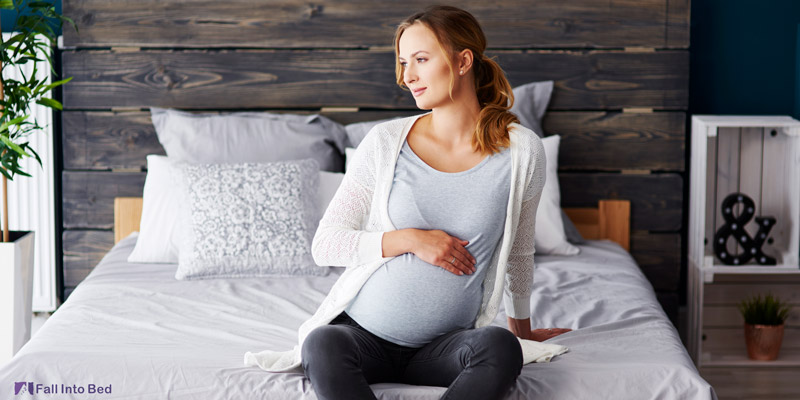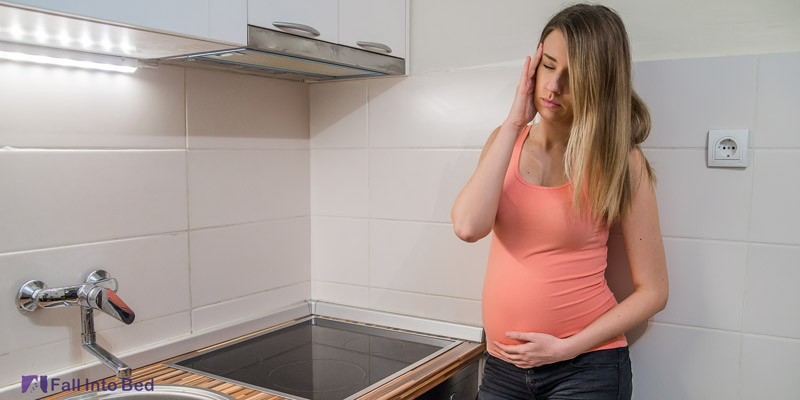We all know how important sleep is. And during pregnancy the importance of sleep is even more. At this time, lack of sleep or even oversleeping can have negative effects on your health and your baby’s as well.
So, in this article we will go over essential points about pregnancy and sleep, like the recommended sleeping positions, duration of sleep and so on.
How is sleep affected by pregnancy?
One of the things that is negatively affected by pregnancy, is sleep. Because of the changes in your body, your sleep might be light or easily interrupted. This changes can be vomiting, nausea, frequent need to urinate at nights, increased heartrate and body temperature, and sleep disorders like insomnia, sleep apnea and restless leg syndrome.
In order to have a closer look at the effects of pregnancy on sleep, let’s break it down in to three trimesters:
First Trimester
- Pregnant individuals often feel more fatigued due to hormonal changes.
- Nausea and other symptoms might disturb sleep.
- Naps during the day can be helpful to counteract tiredness.
Second Trimester
- Many women experience improved sleep compared to the first trimester.
- However, physical changes and discomforts might still cause interruptions.

Third Trimester
- Sleep can become more challenging due to the size of the belly, frequent urination, leg cramps, and discomfort.
- Using pillows for support and practicing good sleep hygiene can help.
Sleep disorders and conditions during pregnancy
Sleep apnea
Due to the weight gain, many woman experience snoring during pregnancy. And some even develop sleep apnea. Sleep apnea can be characterized by shortness of breath, repetitive pauses in breathing and snoring. Study shows that 1 in 5 pregnant women experience sleep apnea during this time.
If you suffer from sleep apnea or any other breathing problems during sleep, you should check out the best sleeping positions for breathing problems.
Preeclampsia
Preeclampsia is characterized by constant high blood pressure during pregnancy or after giving birth. Other symptoms are:
- Significant amount of protein in urine
- Swelling
- Shortness of breath due to fluid in the lungs
Complications can be preterm birth, seizures, fluid in the lungs and organ damage particularly liver and kidney.
This condition usually occurs during first pregnancies in women younger than 20 or older than 35.
Treatment can vary from bed rest and medication to hospitalization and monitoring.
Morning sickness
Morning sickness is a very common condition, experienced by most pregnant women and it is characterized by nausea, vomiting and sensitivity to smells. Despite the name, morning sickness does not just occur in the morning, and it can happen at any time of the day. This issue usually begins around the 6th week of pregnancy and goes away by the 12th week. Sometimes lack of sleep can create nausea on its own.

Restless leg syndrome
RLS is known far a feeling of tingling or itching in your legs and a constant urge to move the legs. This syndrome can be caused by iron deficiency and hormonal changes.
While RLS can be very uncomfortable and disruptive to sleep, it doesn’t typically pose a direct risk to the pregnancy or the baby. However, poor sleep can affect the overall well-being of the mother, potentially leading to increased stress and fatigue.
Back pain
Due the growing baby in your belly, you might experience back pain that can disrupt your sleep and finding the right sleeping position for lower back pain might not be easy for you on that situation.
You should avoid lifting heavy objects during the day and rest with your legs up.
Frequent bathroom calls
When a baby is growing in your belly, your uterus can push your bladder down and this causes you to have more bathroom breaks than before and at least one or two in the middle of the night which can interrupt your sleep.
Kegel exercises can strengthen the pelvic floor muscles and improve bladder control.
why is sleep important during pregnancy?
Sleep during pregnancy is not only important for you, it also plays as essential role in your baby’s growth.
For the mother, sleep deprivation can lead to fatigue, decreased immune system function, poor decision making, mood, appetite, etc.

How does lack of sleep affect pregnancy?
Lack of sleep during pregnancy can really take a toll on both mom and baby. For the mom, not getting enough rest can lead to higher stress levels, anxiety, and even depression, making it tough to get through the day. Physically, it can raise the chances of issues like gestational diabetes and high blood pressure, and it might even make labor longer.
Plus, being constantly tired weakens the immune system, making it easier to catch a cold or other illnesses. For the baby, if mom isn’t sleeping well, it can sometimes lead to lower birth weight and even preterm birth. So, getting enough sleep is super important for both mom’s health and the baby’s development.
How much sleep do you need during pregnancy?
Usually during pregnancy body needs more sleep than before, which is at least 7 hours depending on your lifestyle and habits. Though it’s not easy to have a deep sleep during this time and a lot of things can affect the quality of your sleep and sleep cycles. You can:
- Take naps during the day. If you get a headache after your naps, you can check out the article about how we can prevent the headaches after sleep.
- Going for a walk ain the late afternoon can help you have a better sleep and fall asleep quicker.
- Avoid consuming tea, coffee or any drinks that contains caffein after 5 p.m.
Best sleeping positions during pregnancy
There are a lot of things to consider when choosing a sleep position during pregnancy. However, the most recommended position to sleep in, is sleeping on the left side. This way, blood flow to the fetus is increased. It also reduce some of the pressure on the liver and your back. You can read more about side sleeping and the benefits of sleeping on the right side and left side.
On the other hand, worst sleeping positions for pregnant individuals are sleeping on the stomach and lying flat on your back. These positions increase pressure on blood vessels and reduce blood circulation. They can also make breathing more difficult, as these positions are some of the worst positions for breathing problems.

Sleep is one if the most essential things during pregnancy to guaranty the health of both mother and baby. With the information that you know have about the factors of sleep in pregnancy, you are one step closer to an easier pregnancy time.








